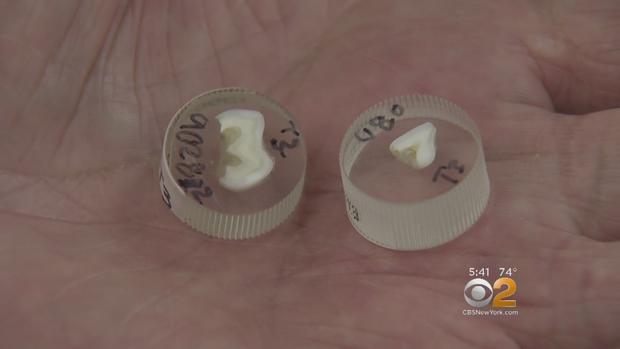HealthWatch: Baby Teeth Said To Hold Key To Emergence Of Autism Later In Life
NEW YORK (CBSNewYork) -- It's an amazing discovery that could lead to a way to predict which children will develop autism.
Believe it or not, it's by analyzing baby teeth.
As CBS2's Dr. Max Gomez reported Thursday, local researchers have found that there are differences in baby teeth even before birth.
MORE: Helpful Tips For Parents Of Children With Autism
Teeth start to form around the end of the first trimester of pregnancy. From that point on, teeth are like growth rings in trees, recording the biochemistry of the fetus.
It turns out those life signatures that are even present at birth can predict the emergence of autism later in childhood.
"From birth I knew there was something different about Naftali. He was passive," Avigael Wodinsky said.
Wodinsky was describing her 12-year-old son, and how different he was from his twin sister, Tzipporah. It took a little while, but a mother's intuition eventually became a feared diagnosis.
"By 15 months, he had a diagnosis of autism, moderate to profound," Wodinsky said.
That allowed Naftali to begin intensive behavioral and physical intervention, that today allows him to be mainstreamed. He even understands a little about his condition.
"That my brain's larger and my head is shaped different," Naftali said.
When asked if he ever wished his brain worked a little differently or more like his sister, Naftali said, "Sometimes I wish it worked like every other normal boy."
MORE: Michigan Says Autism And Arthritis Now Treatable By Medical Marijuana
Experts say that early intervention like Naftali's makes a big difference in an autistic's eventual functioning. So what if there were a way to predict early on who's going to develop autism?
"What we found was that even before we are born, certain, essential elements are not metabolized or regulated well in those children who end up developing autism," said Dr. Manish Arora of the Icahn School of Medicine at Mount Sinai. "The two elements that we found to be most dysregulated are zinc and copper."
Arora and colleagues are able to detect this copper and zinc dysregulation by drilling tiny holes through baby teeth and analyzing the way those elements are embedded in the growth rings of teeth. And even though there's a genetic component to autism, the problem appears to be random because sometimes even in identical twins, one will be autistic and the other normal.
The goal is to find even earlier markers than teeth.
"We can hopefully develop an early warning system, a biomarker or an assay, a test that allows us to tell mothers and fathers that their child is perhaps at higher risk," Arora said.
MORE: Hormone Linked To Autism May Provide New Test And Treatment
Naftali is doing so well, he and and his sister have the same conflicts of any 12-year-olds.
"Even though he sometimes doesn't see it, I actually do love him a bit. But most of the time, he makes it very hard for me to because he'll start screaming at me without telling me why," Tzipporah said.
The importance of early detection and diagnosis is that there are certain developmental windows in young children for language, socialization and so on that start to close in early childhood. That window of opportunity for intervention is critical for improving function in an autistic child.




